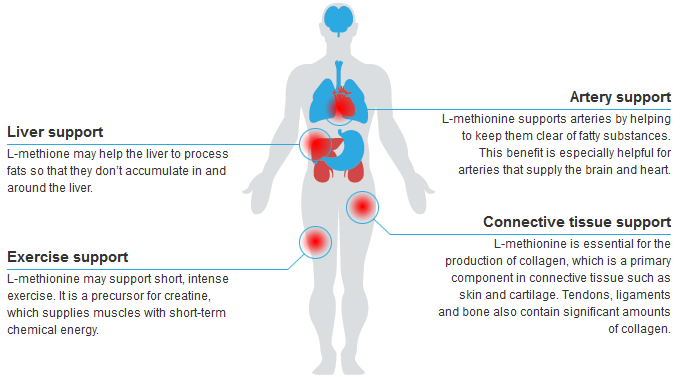L-methionine is an essential sulfur-containing amino acid that supports liver function by preventing fat accumulation, aids exercise recovery and connective tissue production via creatine and collagen synthesis, and promotes cardiovascular health by maintaining clear arteries, benefiting those with deficiencies like vegetarians who may experience fatty liver, edema, or skin lesions.
L-methionine is an essential amino acid in all multi-celled animals. It must be obtained from diet and food sources since it is unable to be biosynthesized in the body. The minimum daily requirement of L-methionine for an adult male is 13 milligrams per kilogram of body weight. This quantity is normally easy to obtain from a complete diet.
L-methionine is one of the 20 proteinogenic amino acids in humans, meaning that it is used to synthesize proteins. It is one of only two of proteinogenic amino acids that contain sulfur, with the other one being cysteine. Methionine acts as a sensor for a few reduction-oxidation (redox) reactions but does not otherwise play a catalytic role in human biochemistry. Biochemists have conjectured that this lack of a strong role is an indication that L-methionine became part of the human genetic code relatively recently.
The highest concentrations of L-methionine are found in animal protein such as beef, fish, poultry and eggs. Some plants seeds such as Brazil nuts and sesame seeds also contain significant levels of L-methionine. Additional plant-based sources of L-methionine include cereal grains. The commercial synthesis of L-methionine involves a chemical process that uses acrolein as a precursor.
The support of healthy liver function is one of the most common reasons for taking L-methionine. They are also used to support exercise recovery, connective tissue production and cardiovascular health.
L-methione may help the liver to process fats so that they don’t accumulate in and around the liver.
L-methionine may support short, intense exercise. It is a precursor for creatine, which supplies muscles with short-term chemical energy.
L-methionine supports arteries by helping to keep them clear of fatty substances. This benefit is especially helpful for arteries that supply the brain and heart.
L-methionine is essential for the production of collagen, which is a primary component in connective tissue such as skin and cartilage. Tendons, ligaments and bone also contain significant amounts of collagen.

The people most likely to have a deficiency of L-methionine are those with a low intake of animal protein such as strict vegetarians. The most common signs of an L-methionine deficiency include a fatty liver, edema and skin lesions. Children who don’t receive enough L-methionine in their diet may also have a growth rate that’s below average. Low L-methionine levels may contribute towards other conditions such as hair loss, low moods and muscle weakness.
L methionine, methionine
Shipping calculated at checkout
